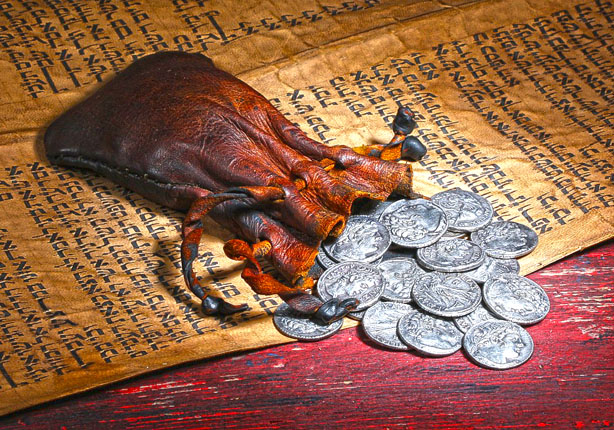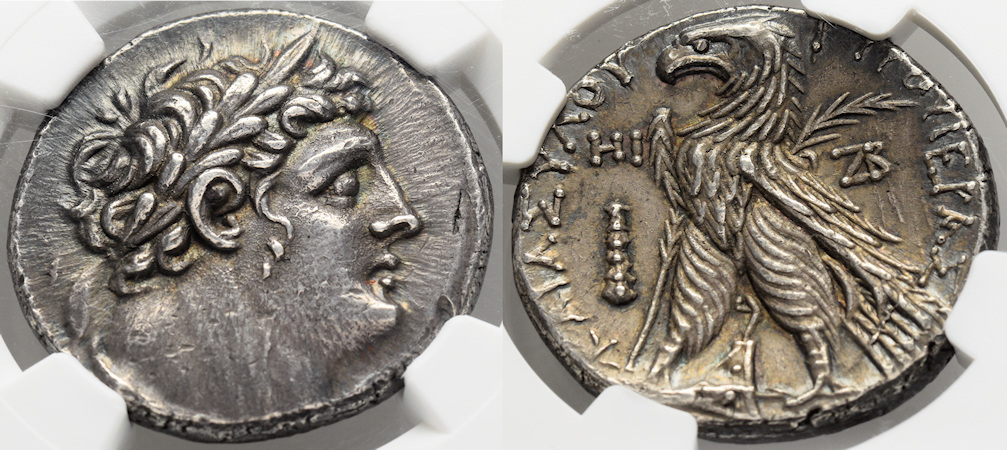
Biblical researchers have always known that in the Bible, numbers are never ever coincidental and can be both specific and symbolic. Some numbers have a story. Let us explore the prophetic evidence for the 30 Shekels.
Thirty pieces of silver or 30 shekels tells a story immediately identifiable to most Christian followers. It was the blood money paid to Judas by Jewish spiritual leaders– payment for his betrayal of Jesus. When we hear “30 pieces of silver” we imagine betrayal of the worst possible kind. Greed. Overall oppression. Regret.
However 30 shekels – or pieces of silver appear numerous other times in the Bible’s meta-narrative too.
1. Exodus– the amount to make up for the death of a servant
In Exodus 21 the Lord communicates through Moses the regulations surrounding accidents. If a bull wounds a male or female servant, the owner needs to pay thirty shekels of silver to the master of the servant, and the bull should be stoned” (v32).
2. Leviticus– the amount to dedicate a woman to the Lord
Leviticus 27 sets out the guidelines around devoting something to the Lord– whether it be an individual, an animal, land or property– and how to “redeem” or buy back your oath. The worth of a male 20-60 years of ages was set at 50 shekels, and a woman’s worth was set at 30.
3. Zechariah– the amount paid the shepherd
Zechariah 11 pertain to false shepherds (leaders) of Israel. In an acted parable, Zechariah himself ends up being the shepherd over the people and does away with 3 false shepherds. This passage is a segment of the whole messianic passage of chapters 9-12. Here, Israel deny this true messianic shepherd too, and he breaks among one of his staffs called “Favor” to demonstrate that they have actually broken their covenant with the Lord. At this moment, Zechariah resigns from his shepherd position, asking just the rate of a servant (30 shekels) for his efforts. God commands him to toss the money to the potter in the Temple. One author proposes that the concept is that the potter can then style an idol out of the silver, sealing the people’s rejection of the Lord. At that point, Zechariah breaks his 2nd staff, called “Union,” to signify the rupture within the people themselves. They have actually separated not only with God, and with one another.
4. Matthew– the amount paid for Jesus’ betrayal
Though Matthew, Mark and Luke contain Judas’ betrayal of Jesus, basically only Matthew the tax collector mentions the precise cost. Matthew understands the prophetic evidence for the 30 Shekels.
And the chief priests would have recognized the Old Testament laws set out in the Pentateuch. In their assessment, at the very least, Jesus’ life is equivalent to that of a servant. Or a female. It appears a deliberate act of dishonour.
Isaiah’s prophetic words ring in our ears:
He was despised and rejected by man,
a man of sorrows, and familiar with suffering.
Like one from whom men hide their faces he was despised,
and we respected Him not (Isa 53:3).

The Big Story exposes a Messiah we never ever anticipated. One we “respected not.”
We never ever anticipated a servant king.
The true King lowered Himself. Walked the ground He had created. He did not come to be served, however to serve, and to offer His life as a ransom for many (Mark 10:45). It’s figuratively suitable that the one who deliberately took up the form of a bond-servant would be put to death at the cost of a servant.
We could not have actually prepared for a dishonored teacher.
Though social honor is determined in part by the friends one keeps, Jesus continuously defied expectations of with whom an honored teacher ought to associate.
Jesus’ inner circle consists of women. Ladies finance His ministry. Sit at His feet in the function of a pupil. Jesus does not pick an equitable inner circle, however invests His social credit offering honor to the lowly. He goes to sinners’ homes and consumes with them – both actions which bestow honor. He protects His decision to hang out with sinners and tax collectors to spiritual leaders.
We never ever anticipated the promised Shepherd of Israel to be led like a lamb to slaughter.
He was oppressed and afflicted,
yet He did not open His mouth;
He was led like a lamb to the slaughter,
and as a sheep prior to her shearers is silent,
so He did not open His mouth (Isaish 53:7).
The total worth of God’s present to us can never ever be computed.
No matter how much we look at it, the numbers will never ever add up. Jesus lived an example of downward mobility. We have actually gotten all God’s riches at Christ’s expense. Hallelujah!
Those who follow Jesus invest their lives astonished by the riches of His abstruse grace.
In awe of our addition in His story.
Return from “Prophetic Evidence For The 30 Shekels” to “Prophetic Evidence For The Bible”